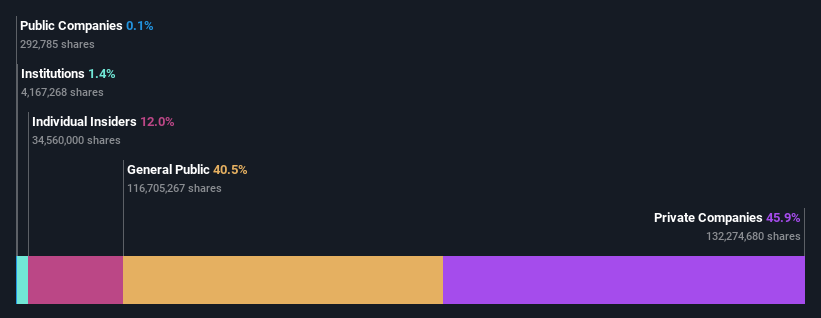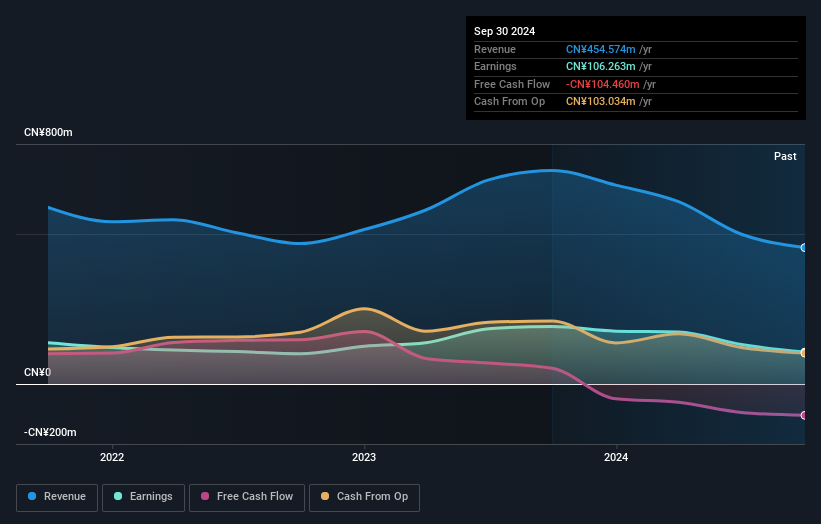Hubei Biocause Heilen Pharmaceutical Co., Ltd.'s (SZSE:301211) stock price dropped 7.1% last week; private companies would not be happy
Key Insights
- Hubei Biocause Heilen Pharmaceutical's significant private companies ownership suggests that the key decisions are influenced by shareholders from the larger public
- 50% of the business is held by the top 2 shareholders
- 12% of Hubei Biocause Heilen Pharmaceutical is held by insiders
A look at the shareholders of Hubei Biocause Heilen Pharmaceutical Co., Ltd. (SZSE:301211) can tell us which group is most powerful. With 46% stake, private companies possess the maximum shares in the company. In other words, the group stands to gain the most (or lose the most) from their investment into the company.
As a result, private companies as a group endured the highest losses last week after market cap fell by CN¥415m.
Let's delve deeper into each type of owner of Hubei Biocause Heilen Pharmaceutical, beginning with the chart below.
See our latest analysis for Hubei Biocause Heilen Pharmaceutical

What Does The Institutional Ownership Tell Us About Hubei Biocause Heilen Pharmaceutical?
Institutions typically measure themselves against a benchmark when reporting to their own investors, so they often become more enthusiastic about a stock once it's included in a major index. We would expect most companies to have some institutions on the register, especially if they are growing.
Since institutions own only a small portion of Hubei Biocause Heilen Pharmaceutical, many may not have spent much time considering the stock. But it's clear that some have; and they liked it enough to buy in. If the business gets stronger from here, we could see a situation where more institutions are keen to buy. When multiple institutional investors want to buy shares, we often see a rising share price. The past revenue trajectory (shown below) can be an indication of future growth, but there are no guarantees.

Hedge funds don't have many shares in Hubei Biocause Heilen Pharmaceutical. The company's largest shareholder is Sunline Group Co., Ltd., with ownership of 38%. Tianchao Liu is the second largest shareholder owning 12% of common stock, and Jingmen Ningkang Enterprise Management Center (Limited Partnership) holds about 5.6% of the company stock.
A more detailed study of the shareholder registry showed us that 2 of the top shareholders have a considerable amount of ownership in the company, via their 50% stake.
While studying institutional ownership for a company can add value to your research, it is also a good practice to research analyst recommendations to get a deeper understand of a stock's expected performance. We're not picking up on any analyst coverage of the stock at the moment, so the company is unlikely to be widely held.
Insider Ownership Of Hubei Biocause Heilen Pharmaceutical
While the precise definition of an insider can be subjective, almost everyone considers board members to be insiders. The company management answer to the board and the latter should represent the interests of shareholders. Notably, sometimes top-level managers are on the board themselves.
Most consider insider ownership a positive because it can indicate the board is well aligned with other shareholders. However, on some occasions too much power is concentrated within this group.
Our information suggests that insiders maintain a significant holding in Hubei Biocause Heilen Pharmaceutical Co., Ltd.. Insiders have a CN¥652m stake in this CN¥5.4b business. It is great to see insiders so invested in the business. It might be worth checking if those insiders have been buying recently.
General Public Ownership
The general public-- including retail investors -- own 41% stake in the company, and hence can't easily be ignored. This size of ownership, while considerable, may not be enough to change company policy if the decision is not in sync with other large shareholders.
Private Company Ownership
We can see that Private Companies own 46%, of the shares on issue. It might be worth looking deeper into this. If related parties, such as insiders, have an interest in one of these private companies, that should be disclosed in the annual report. Private companies may also have a strategic interest in the company.
Next Steps:
While it is well worth considering the different groups that own a company, there are other factors that are even more important. Case in point: We've spotted 2 warning signs for Hubei Biocause Heilen Pharmaceutical you should be aware of.
Of course this may not be the best stock to buy. Therefore, you may wish to see our free collection of interesting prospects boasting favorable financials.
NB: Figures in this article are calculated using data from the last twelve months, which refer to the 12-month period ending on the last date of the month the financial statement is dated. This may not be consistent with full year annual report figures.
Valuation is complex, but we're here to simplify it.
Discover if Hubei Biocause Heilen Pharmaceutical might be undervalued or overvalued with our detailed analysis, featuring fair value estimates, potential risks, dividends, insider trades, and its financial condition.
Access Free AnalysisHave feedback on this article? Concerned about the content? Get in touch with us directly. Alternatively, email editorial-team (at) simplywallst.com.
This article by Simply Wall St is general in nature. We provide commentary based on historical data and analyst forecasts only using an unbiased methodology and our articles are not intended to be financial advice. It does not constitute a recommendation to buy or sell any stock, and does not take account of your objectives, or your financial situation. We aim to bring you long-term focused analysis driven by fundamental data. Note that our analysis may not factor in the latest price-sensitive company announcements or qualitative material. Simply Wall St has no position in any stocks mentioned.
About SZSE:301211
Hubei Biocause Heilen Pharmaceutical
Hubei Biocause Heilen Pharmaceutical Co., Ltd.
Flawless balance sheet with slight risk.
Market Insights
Community Narratives




